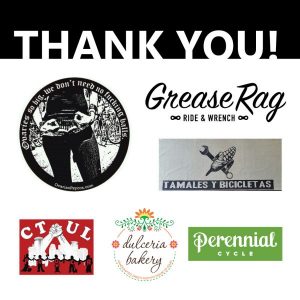 Back in 2012, I organized a National Women’s Bicycling Summit in Long Beach, CA — and I’m embarrassed to recall how narrow and harmful my vision was.
Back in 2012, I organized a National Women’s Bicycling Summit in Long Beach, CA — and I’m embarrassed to recall how narrow and harmful my vision was.
White savior talking about gifting bikes to villages in Africa. A bike fashion show that was… beyond words. Even I cringed through half of the program.
Still, despite the fact that I invited them to be on an equity panel (Yep! Did that, too!), three young leaders from the Ovarian Psycos graciously accepted an invitation to speak. Representing their women of color led group ,which actively confronts injustice and builds radical community, they blew sh*t up with their rejection of the cartoonish but prevailing image of women in the bike advocacy community: compliant, skirt-wearing, white ladies riding Dutch bikes.
Just this month, I got schooled by the Ovas again, as founder Xela de la X came to Minneapolis for our screening of the Ovarian Psycos documentary. Not only did she make me consider my own role in perpetuating white supremacy as a communicator and cyclist — but she also addressed criticism that the Ovas’ language is unwelcoming to trans, non-binary and disabled folx.
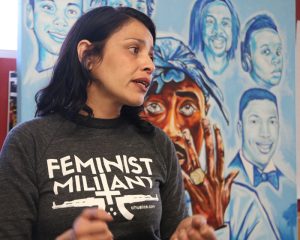
Xela at the Grease Rag screening, photo by Monica Bryand
One of the most important moments for me came before the film, as Xela explained the deeply problematic nature of white filmmakers telling the stories of women of color. That had a special sting. I was a reporter for many years, telling stories of powerful people, like Xela, in ways that were likely tokenizing and superficial. In my current job, I do communications around an issue that disproportionately impacts communities of color — an issue I’ve never personally experienced.
It was uncomfortable, but necessary, to hear Xela talk about how that “white gaze” romanticizes and flattens fights against oppression, often leaving unexamined the role of white folx in creating and perpetuating the racist systems — and then discovering or “lifting up the stories” of people acting for their liberation. Not to mention minimizing or omiting community-driven solutions because they threaten the current paradigm.
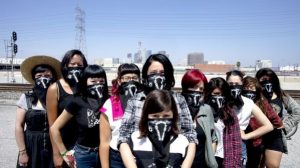
Photo courtesy of filmmakers
As she spoke about the filmmakers doggedly pursuing the Ovas even after they said they weren’t interested in being the subject of a film, I reflected on my audacity to believe I have the right or ability to tell these stories at all, rather than using any power or privilege to pass on skills and resources to community members to create and share their own narrative.
And, maybe more than anything else, she made clear the imperative that the characters in the story have the right to review and determine how their story is told — a concept they definitely didn’t teach me in journalism school.
With that preface, I watched the documentary with a different lens. Yes, it’s deeply moving in telling the personal stories of several leaders who have endured unspeakable hardships, and the imagery of LA streets full of rowdy WTF riders taking up space and celebrating their power is f*cking awesome. But I could see a tinge of that white gaze.
After the film, Xela took a few questions and there was such a passion and urgency in her voice. When I had the privilege to ask her about the Ovarian Psycos’ work pushing back against gentrification, she described their efforts by saying, “This is war.” Rather than patiently waiting for their communities to be colonized and destroyed as elected officials or advocates bumble to come up with ivory tower policies to combat displacement, the Ovarian Psycos are taking direct action in defense of their families and neighbors.
That wasn’t in the documentary.
That reality, the life and death implications of our white supremacist, capitalist institutions, doesn’t show up in most of our bike spaces, either. And that silence — or worse, erasure — is violence, too.
And Xela owned that the Ovas have heard the concerns that they are complicit in erasing WTF identities, as well. As has been cited in other stories (h/t to Z’s comment in Low’s post this week), the language infused throughout the group’s work and identity is gender essentialist and trans-exclusive. Xela said they’re working to address those valid critiques and are in the process of changing some aspects of their group expression.
One of the goals of the documentary screening was to raise money for the Ovarian Pyscos healing space in LA and to support BIPOC (Black, Indigenous, People of Color) leaders within Grease Rag. In just a few hours, we raised more than $1,100.
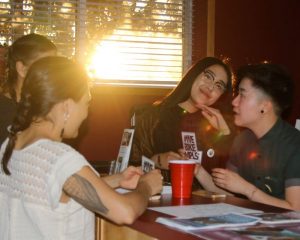
Local leaders and organizers
(Photos by Monica Bryand)
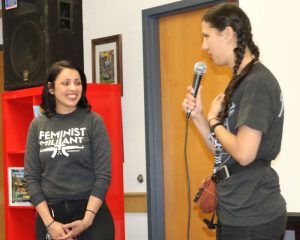
Xela and Grease Rag leader, Low
(Photos by Monica Bryand)
For me the screening was a warm reminder of the solidarity that has been and is constantly being created with Grease Rag. It reminded me that we need to vigilant in addressing oppresive behavior — and be eager to receive and act on that input.
So much gratitude to Xela and the Ovarian Psycos, as well as everyone who made the screening happen!
